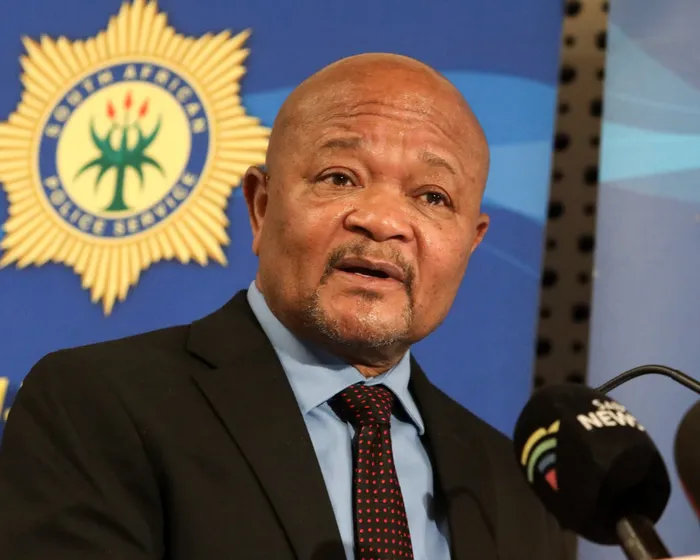Mchunu faces backlash over R120.8 billion police budget

Minister of Police Senzo Mchunu said they have prioritised budget allocation to Gauteng, KZN, Western Cape, and the Eastern Cape, where crime is concentrated.
Image: Jacques Naude / Independent Newspapers
Police Minister Senzo Mchunu on Friday said the parties that did not support the budget for his department were unrealistic and reacting excessively.
“Those who say they don't support the budget, what they mean is that in the areas and homes where they come from, they want us to withdraw the services that are there. Your reaction says what you say is unrealistic. It is being excessive unnecessarily,” Mchunu said.
He made the statement when responding to the budget debate for SAPS, the Independent Police Investigative Directorate, and the Civilian Secretariat for Police Service after presenting the department’s R120.8 billion budget for 2025/26.
Mchunu said they appreciated the allocation, but was under no illusion about the scale of the task ahead.
“The work that needs to be done far exceeds the resources available. Crime is adaptive, dynamic and, in many cases, well-financed and so must our response be.”
Mchunu said of the total allocation, R219.2 million was for securing the G20 conference scheduled for November, R400m for the 2026 local government elections, and R34.8m to support the costs associated with the appointment of an additional deputy minister as well as R150m for the Directorate for Priority Crime Investigation (DPCI).
The salaries and benefits of employees take a huge chunk of the total budget.
The minister said they have prioritised budget allocation to Gauteng, KwaZulu-Natal, Western Cape, and the Eastern Cape, where crime is concentrated.
“It is clear that identified high crime zones in all four provinces require intelligence-led targeted deployment of specialised units to combat criminality, over and above Operation Shanela. A total of 225 hotspot police stations have been identified, demanding targeted and synchronised interventions."
A total of R85 million has been allocated to support the top 30 high-contact crime stations.
MK Party MP David Skosana said South Africans were betrayed by the institutions meant to safeguard them.
“SAPS and IPID fail in their mandate to protect and be held accountable,” he said.
Skosana said SAPS was supposed to serve the people, but there were horrifying crimes against women and children, while the detection rate for murder was at a critically low level.
“This budget, if passed in the current form, is a death sentence. Thousands of South Africans will continue to be failed by the State.”
Skosana observed that R72bn was channelled towards administration, R24bn to detectives, and R1.7bn to the forensic science laboratories.
EFF MP Leigh-Ann Mathys said SAPS was a criminal syndicate where there was institutionalised criminality.
“If there is no urgent reform, there is nothing that is going to happen. You can hire as many more young recruits, these young recruits will be recruited into criminality that is deeply embedded in SAPS,” Mathys said.
ACDP leader Kenneth Meshoe decried the mass arrest of senior police officials and said that despite an increase in the budget, there were systemic failures.
DA MP Ian Cameron said effective policing should have integrity as its foundation.
“We should be able to say it must be a practical commitment to make,” he said.
In response, Mchunu said 5,500 police trainees were receiving training at the various SAPS academies nationwide.
“We have advertised for the recruitment of 5,500 police trainees, who will commence with their training between January and February 2026. On the 30th of June, we introduced the online electronic recruitment system, allowing for applicants to apply online – a first for the organisation.”
He also said the DPCI will strengthen its focus on national priority crimes, including serious corruption, cybercrime, and unresolved cases linked to the Truth and Reconciliation Commission.
The DPCI will also undertake a comprehensive recruitment drive in 2025/26 with internal advertisement of 300 posts through a post-promotion process, 250 police trainees with qualifications in law, forensic investigation, and information technology will be placed within the directorate.
“The DPCI has also advertised 85 posts externally and plans to advertise a further 175 posts to capacitate the DPCI, including to attract skills such as forensic accountants, IT specialists, and financial investigators.”
Mchunu added that before the end of this year, a temporary forensic science laboratory would be functional in KwaZulu-Natal.
“It will be helpful in terms of reducing backlogs that pile up in Gauteng,” he said.
Mchunu also mentioned that negotiations were under way with the Council for Scientific and Industrial Research to establish an additional forensic science laboratory.
“We hope this will go a long way to meet our obligations,” he added.
mayibongwe.maqhina@inl.co.za
Related Topics: